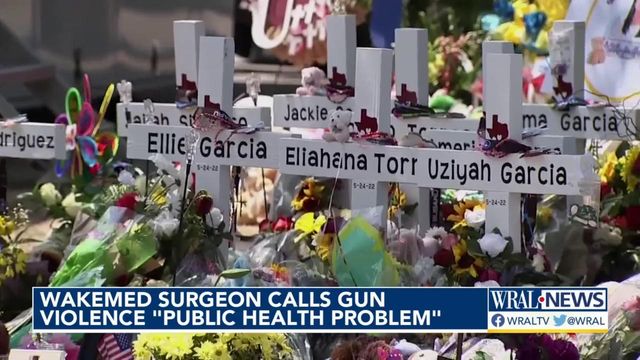OSI UDEKWU: Gun violence epidemic - We need the paradigm to change
Saturday, June 4, 2022 -- Irrespective of political background, we need to demand that "our way of life" is protected at home. Why should school children be afraid of being killed at school? Reasonable efforts to restrict access to firearms from behaviorally stressed individuals, requirements for training and safe storage, de-escalation of political acrimony and addressing known social inequities in vulnerable areas are efforts that could immediately start to turn the tide without taking away our right to bear arms.
Posted — UpdatedNational Gun Violence Awareness Day is not only a moment to honor the countless victims and survivors of gun violence — it marks our time for courage and action. We must change the status quo and make our communities safer from gun violence.
This year, as has happened before, I am forced to ask myself about “our way of life.” We live in the wealthiest country in the world and are unable to protect elementary school children from wanton violence perpetrated in a recurring pattern involving firearms. We have only recently been unchained from federal legislation prohibiting funding for violence prevention studies directed at firearms. We resist looking at firearm violence as a public health problem and associate any efforts to control it as an assault on our individual liberty and right to bear arms.
While the frequency of firearm injuries varies across the U.S., it is, in general, higher than in other economically developed countries. Violence in the form of homicide or suicide accounts for large numbers of deaths and injuries every day and firearm injuries now account for the greatest number of deaths in U.S. children and adolescents.
WakeMed’s Level I Trauma Center is one of the busiest in the state. We put 4,800 patients in our trauma registry annually and about 20% are penetrating injuries, which are mostly gunshot wounds. 10% of those gunshot wounds are children who accidentally shot themselves or who were shot by someone else.
Common sense public health approaches to risk reduction are resisted despite these escalating problems. While the elimination of firearms is likely an unachievable goal, there are countries where a relatively safe co-existence between private firearm ownership and community safety have been achieved.
Countries such as Finland and Norway have very high rates of firearm ownership but are largely restricted to hunting rifles and shot guns. And in Switzerland, where military service is obligatory and there are traditionally liberal gun laws, training and registration is required for firearms. Things such as large capacity magazines are illegal.
State sanctioned organized violence in the form of war has been around since the dawn of humanity, and over time “rules of war” or engagement have been promulgated to protect non-combatants. Weapons in the U.S. military are secured after training or deployment and there is a strong focus on training and safety.
Civilian ownership does not necessarily come with a legal burden regarding storage and use. Increasing social stress, portrayal of militaristic imaging and the perception of societal instability have joined with the easy availability of firearms to create a public health nightmare.
Is there not a societal obligation to protect the same noncombatants outside of war, at home?
While a mass shooting in a school is one of the most horrific manifestations of societal failure to protect “our way of life,” it is by no means the only manifestation.
A small child who shot and killed themselves accidentally with their parent’s legal pistol. Suicide by teenagers embarrassed by images seen by others with or without threats of exposure. These are just some of the preventable scenarios where access and behavioral health intersect, and we resist modification because we are convinced that the current ‘status quo’ cannot be changed.
We need the paradigm to change. Irrespective of political background, we need to demand that “our way of life” is protected at home.
Why should school children be afraid of being killed at school?
Reasonable efforts to restrict access to firearms from behaviorally stressed individuals, requirements for training and safe storage, de-escalation of political acrimony and addressing known social inequities in vulnerable areas are efforts that could immediately start to turn the tide without taking away our right to bear arms.
We need the courage to make change now more than ever. Our children deserve no less.
Copyright 2024 by Capitol Broadcasting Company. All rights reserved. This material may not be published, broadcast, rewritten or redistributed.





